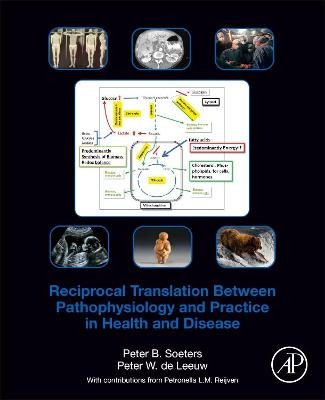
Reciprocal Translation Between Pathophysiology and Practice in Health and Disease
Academic Press Inc (Verlag)
978-0-12-820205-0 (ISBN)
With contributions from Petronella L.M. Reijven.
Peter B. Soeters, MD, PhD is Emeritus Professor of Surgery at Maastricht University and retired in 2006. He has been a licensed surgeon and intensivist and after starting general surgery gradually focused on patients with abdominal catastrophe (inflammatory bowel disease, postoperative or spontaneous abdominal complications) and morbid obesity. He introduced artificial nutrition in 1970 in the Netherlands. In 1984 he established a surgical laboratory, in which interorgan inflammatory metabolism was studied in small and larger animal models and studies in humans were supported. He supervised 35-40 PhD students addressing these issues. Twelve of these PhD students became full professors. He published 280 peer reviewed papers, 65% of them as first or last author (H-index 72) He held several positions in Surgical, Gastroenterological, Hepatological, Nutritional/ Metabolic Societies and scientific journals nationally and internationally, and holds 8 honorary memberships of these societies. He was knighted in the order of the Dutch Lion in 2006. Peter W. de Leeuw, MD, PhD is emeritus professor of Medicine at the University of Maastricht. His research interest is in cardiovascular medicine. He has published over 480 articles and reviews and served on the editorial board of more than 20 international journals. He also served as Editor-in-Chief of the Netherlands Journal of Medicine, the European Journal of Internal Medicine and the Nederlands Tijdschrift voor Geneeskunde (Dutch Medical Journal). He organized several congresses and symposia and was a steering member on several international trials. He is a member of multiple scientific societies and served in the Council of the International Society of Hypertension. For his scientific work, he received several awards from the High Blood Pressure Research Council of Australia, the European Federation of Internal Medicine and the European Society of Hypertension.
PART I. PATHOPHYSIOLOGICAL MECHANISMS IN DISEASE1. Reciprocal translation between pathophysiology and practice in health and disease2. General principles of the repair mechanism3. Cardiovascular responses to injury4. Insulin resistance as an adaptive mechanism5. Hypercholesterolemia, harm or benefit?6. Macronutrient metabolism in starvation and stress7. The role of ectopic adipose tissue: benefit or deleterious overflow? 8. The gut/liver axis, inflammation and the pathogenesis of metabolic syndrome9. Harm and benefit of the inflammatory responsePART II. CLINICAL MANIFESTATIONS OF ADAPTIVE PATHOPHYSIOLOGY 10. The beneficial role of inflammation and metabolic cycling (Warburg revisited)11. From hepatic encephalopathy to the quality of food protein and pro-tein requirements: a serendipitous journey 12. The underlying metabolism of hypoalbuminemia and its clinical effects13. Cardiovascular stress syndromes14. The benefit of moderate hyperglycemia and hyperlactatemia in critical illness or synthesis of biomass15. Anemia as an adaptive phenomenon16. Vitamin D in health and diseasePART III. IMPLICATIONS FOR TREATMENT 17. Decreases of plasma solutes in health and disease: deficiency or resulting from changing binding proteins and distribution volume?18. Comparable metabolism in pregnancy and cancer: a universal role of the Warburg effect19. Nutritional assessment and the role of pre-existent inflammation with a bearing on COVID-1920. The harm afflicted by NSAIDs, statins and oral antidiabetics by blocking adaptive inflammatory metabolism21. Benefit and concern of ketogenic and vegan diets: a revisit to pathophysiologyPART IV. MECHANISMS PROVIDING INSIGHT IN A FEW ENIGMATIC SYNDROMES22. Pathophysiology in practice: How to manage gastrointestinal surgery in acute and elective disease conditions23. The pathophysiology underlying the obesity and plasma cholesterol paradoxes24. The final conclusion: dogma, bias and big data
| Erscheinungsdatum | 12.04.2021 |
|---|---|
| Verlagsort | San Diego |
| Sprache | englisch |
| Maße | 191 x 235 mm |
| Gewicht | 700 g |
| Themenwelt | Studium ► 1. Studienabschnitt (Vorklinik) ► Physiologie |
| ISBN-10 | 0-12-820205-X / 012820205X |
| ISBN-13 | 978-0-12-820205-0 / 9780128202050 |
| Zustand | Neuware |
| Haben Sie eine Frage zum Produkt? |
aus dem Bereich


